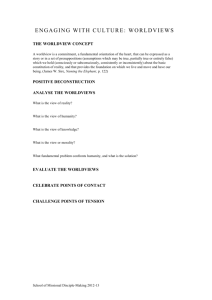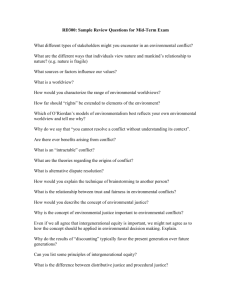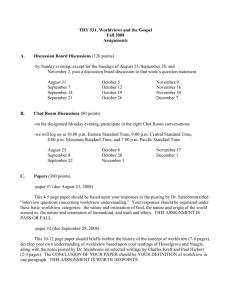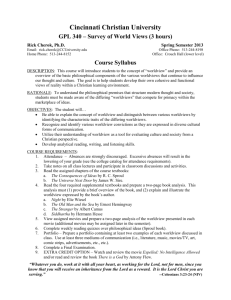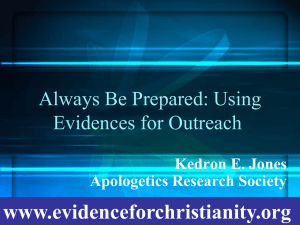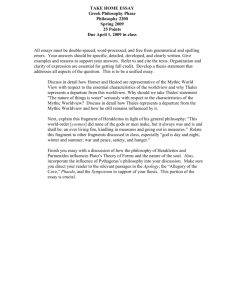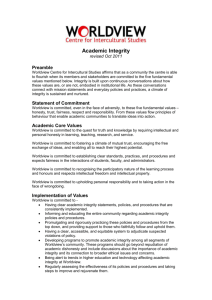What is a worldview?
advertisement
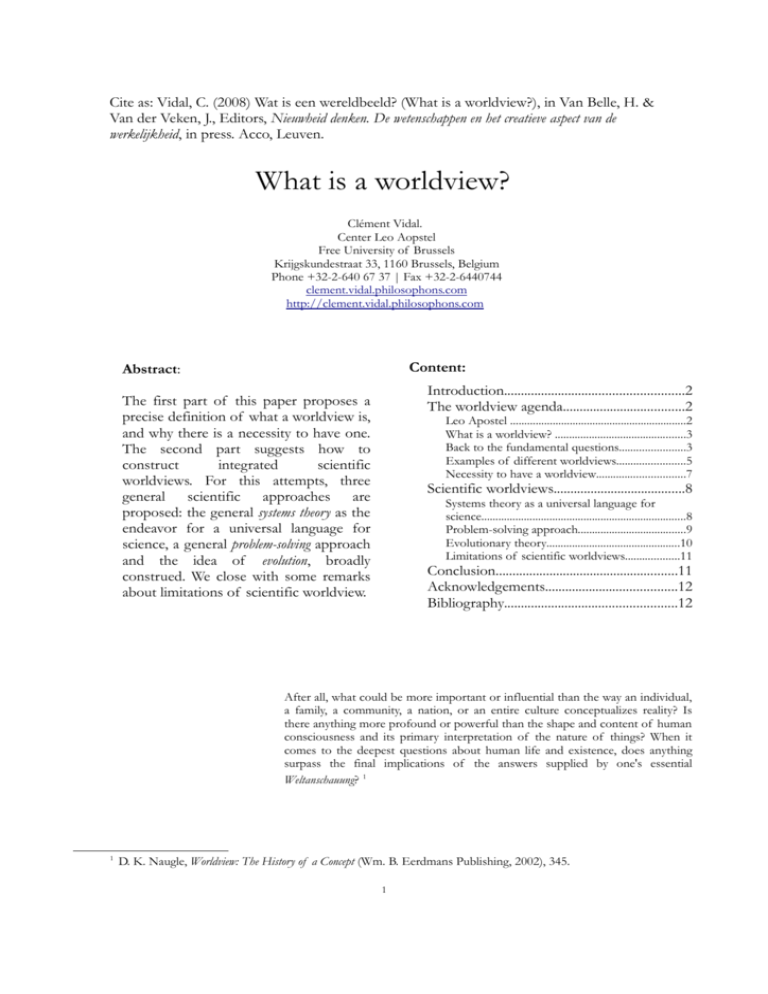
Cite as: Vidal, C. (2008) Wat is een wereldbeeld? (What is a worldview?), in Van Belle, H. & Van der Veken, J., Editors, Nieuwheid denken. De wetenschappen en het creatieve aspect van de werkelijkheid, in press. Acco, Leuven. What is a worldview? Clément Vidal. Center Leo Aopstel Free University of Brussels Krijgskundestraat 33, 1160 Brussels, Belgium Phone +32-2-640 67 37 | Fax +32-2-6440744 clement.vidal.philosophons.com http://clement.vidal.philosophons.com Content: Abstract: Introduction.....................................................2 The worldview agenda....................................2 The first part of this paper proposes a precise definition of what a worldview is, and why there is a necessity to have one. The second part suggests how to construct integrated scientific worldviews. For this attempts, three general scientific approaches are proposed: the general systems theory as the endeavor for a universal language for science, a general problem-solving approach and the idea of evolution, broadly construed. We close with some remarks about limitations of scientific worldview. Leo Apostel ..............................................................2 What is a worldview? ..............................................3 Back to the fundamental questions.......................3 Examples of different worldviews........................5 Necessity to have a worldview...............................7 Scientific worldviews.......................................8 Systems theory as a universal language for science........................................................................8 Problem-solving approach......................................9 Evolutionary theory...............................................10 Limitations of scientific worldviews...................11 Conclusion......................................................11 Acknowledgements.......................................12 Bibliography...................................................12 After all, what could be more important or influential than the way an individual, a family, a community, a nation, or an entire culture conceptualizes reality? Is there anything more profound or powerful than the shape and content of human consciousness and its primary interpretation of the nature of things? When it comes to the deepest questions about human life and existence, does anything surpass the final implications of the answers supplied by one's essential Weltanschauung? 1 1 D. K. Naugle, Worldview: The History of a Concept (Wm. B. Eerdmans Publishing, 2002), 345. 1 Introduction The term worldview (Weltanschauung in German) has a long and fascinating history going back to Kant2. It has been and is used not only in philosophy, but also among others in theology, anthropology, or in education. David K. Naugle wrote a history of this concept and the above quotation shows its central importance. The term is unfortunately often used without any precise definition behind it. What is more precisely a worldview? How can we define it? Even inside philosophy, many different definitions have been provided (e.g. by Kant, Hegel, Kierkegaard, Dilthey, Husserl, Jaspers, Heidegger, etc.). Conducting a systematic historical comparison of the different worldview definitions is outside the scope of this paper3. Instead, we restrict our analysis to a clear and fruitful definition proposed by Leo Apostel and Jan van der Veken that we will detail in our first section. The second part of our analysis starts from the fact that many of our profound age-old philosophical questions can nowadays be tackled by scientific means. However, in trying to build a comprehensive worldview, a problem arises, namely that different scientific disciplines use different languages. This gap is especially important when we consider the difference between exact and human sciences. What are the most suitable features of an integrative scientific worldview? How could these features help to fill this gap? Three general scientific approaches are proposed for this endeavour: systems theory as a universal language for science, a problem-solving approach and the general idea of evolution, broadly construed. We close with some remarks about the limitations of a purely scientific worldview. The worldview agenda Leo Apostel Great philosophers are so because of their ambition to build systems of thought answering a maximum of our deepest philosophical questions. One of the last great attempts was made by Rudolf Carnap. Nowadays, Carnap is almost always quoted in order to be bitterly criticised -and on very strong grounds. However, one of his students, Leo Apostel (1925-1995) kept the same ambition, the same grandeur, without the naive and reductionistic presuppositions of the Vienna Circle. This led him among others to create an interdisciplinary research group, The Worldviews group, and to write a short book together with Jan Van der Veken4, which can be compared with the manifesto of the Wiener Kreis 5. Immanuel Kant, Kritik der Urteilskraft (Critique of Judgment), Ditzingen, Reclam, 1790. part one, book two, section 26. 3 To approach this question, see for e.g. the work of Naugle cited above. 4 L. Apostel and Van der Veken, Wereldbeelden. Van fragmentering naar integratie (DNB/Pelckmans, 1991); Translation: D. Aerts et al., World Views. From fragmentation to integration (VUB Press, 1994), http://www.vub.ac.be/CLEA/pub/books/worldviews.pdf. 5 R. Carnap, H. Hahn, and O. Neurath, Wissenschaftliche Weltauffassung: Der Wiener Kreis, Wissenschaftliche 2 2 The difference between the two is that the latter had a recognition it did not deserve, and the former deserves a recognition that it did not have. What is a worldview? The two concepts “philosophy” and “worldview” are closely related. Talking about "a philosophy" in its broadest sense refers in fact to a worldview. It is the case for example when we speak about the philosophy of the Inuit or the Maya. Wolters6 summarized the relationships between worldview and philosophy. With the definition which will follow, our position tends towards what he calls "worldview crowns philosophy", that is, constructing a worldview is the highest manifestation of philosophy. The term “worldview” is often used to emphasize a personal and historical point of view. In this sense, the term can have a negative connotation for the philosopher, because philosophy generally claims universal validity, as it has a clear association with rational thought. It is however possible to define the class of philosophical worldviews, as rooted in rationality and thus also aiming at a kind of universal validity. The next subsection will expose six questions which constitute our precise definition of what a worldview is. Those general philosophical questions are of paramount importance, constituting an enduring philosophical agenda7. The agenda defines the range of problems and issues that are addressed by a philosophy. With Rescher8, we can distinguish between the “procedural agenda”, which is what we call here the worldview questions; and the “substantive agenda”, which consists of the proposed answers to the questions, and are the worldview components. The components articulated together form a worldview, that we define as a coherent collection of concepts allowing us “to construct a global image of the world, and in this way to understand as many elements of our experience as possible." 9 Back to the fundamental questions In this section we present the six worldview questions. These questions corresponds to the “big”, “eternal”, or “age-old” philosophical questions. . The choice of the questions is motivated in more details in the book by Apostel and Van der Veken 10; also reformulated by Heylighen11. We build on those two references for what follows. The traditional philosophical disciplines can be seen as answering these questions, presented in the table 1 below. Weltauffassung, Sozialismus und Logischer Empirismus., 1929. 6 “On the Idea of Worldview and Its Relation to Philosophy,” Stained Glass: Worldviews and Social Science (1989): 14-25, http://groups.apu.edu/theophil/Culp/Phil496%20Readings/Optional%20Wolters%20Ideas.pdf. 7 Vidal, C. An Enduring Philosophical Agenda. Worldview Construction as a Philosophical Method, Submitted for publication, 2007. http://cogprints.org/6048/ 8 N. Rescher, Philosophical Reasoning: A Study in the Methodology of Philosophizing (Blackwell Publishers, 2001), 33. 9 Apostel and Van der Veken, Wereldbeelden. Van fragmentering naar integratie, 17. 10 Apostel and Van der Veken, Wereldbeelden. Van fragmentering naar integratie. 11 F. Heylighen, “World View,” Principia Cybernetica Web, 2000, http://pespmc1.vub.ac.be/WORLVIEW.html. 3 Question Philosophical Discipline 1. What is? Ontology (model of reality as a whole) 2. Where does it all come from? Explanation (model of the past) 3. Where are we going? Prediction (model of the future) 4. What is good and what is evil? Axiology (theory of values) 5. How should we act? Praxeology (theory of actions) 6. What is true and what is false? Epistemology (theory of knowledge) Table 1: Summary of the worldview questions, with their corresponding traditional philosophical discipline. The first question is the question of ontology; or a model of reality as a whole. It can be typified with the question "What is?". It encompasses questions like, What is the nature of our world? How is it structured and how does it function? Why is there something rather than nothing? etc. The second question explains the first component. Why is the world the way it is, and not different? What kind of global explanatory principles can we put forward? How did the Universe originate? Where does it all come from? The kind of explanation sought here is one in terms of antecedents. Answers to these questions should be able to explain how and why such or such phenomena arose. The third question is complementary to the second one. Instead of focusing on the past, it focuses on the future. Where are we going to? What will be the fate of life in the Universe? It is about futurology, because this component should give us possible futures, with more or less probable developments. But the fact that there remain uncertainties, i.e. that there is more than one outcome possible, leaves us with choices to make. Which alternative should we promote and which one should we avoid? For this, we need values. This brings us to the fourth question. How do we evaluate global reality? What should we strive for? What is good and what is evil? What is the meaning of life? Axiology traditionally deals with those questions, including morality, ethics, and aesthetics. The component should give us a direction, a purpose, a set of goals to guide our actions. The fifth question is about the theory of action, or praxeology. How should we act? What are the general principles according to which we should organise our actions? It would help us to implement plans of action, according to our values, in order to solve practical problems. It is often said that a philosophy is of no use because it is too far from reality, that it does not give any precise answer to concrete questions. This is often true and a praxeology correctly developed should fill this gap. 4 The sixth question is about the theory of knowledge (epistemology). How are we to construct our image of this world in such a way that we can come up with answers to questions 1, 2 and 3? How can we acquire knowledge? The more abstract questions “what are the principles of valid inferences or demonstrations?”, “How can we characterize truth, deduction, existence, necessity, etc. ?” are main issues of logic and philosophy of logic. We can also relate to this component the problem of language; what language should we use for our purposes of knowledge acquisition, and what are its limitations? There is in fact a seventh question, which is a meta-question, asking Where do we start in order to answer those questions? It invites us to seek for partial answers found in the history of ideas and civilizations, preferably being aware of their tradition of thought, and their more or less hidden assumptions. This step is important for example to build a world philosophy12. More generally, philosophical anthropology and history of philosophy operate at this meta-level, allowing a broader analysis of the evolution of different worldviews. Examples of different worldviews To illustrate the worldview components, we will now take four very different examples of worldviews, by considering a scientific and a religious worldview but also the worldview of a bacterium, and of a society (see table 2 below). The scientific and religious worldviews we describe are caricatures. The purpose is not to be accurate in the worldview description, but rather to give some examples of different kinds of worldviews. e.g. Archie J. Bahm, The Philosopher's World Model (Greenwood Press, 1979); Comparative Philosophy: Western, Indian, & Chinese Philosophies Compared, Revised edition. (World Book, 1995); P. Lévy, World philosophie: le marché, le cyberespace, la conscience (Editions Odile Jacob, 2000). 12 5 (a) scientific (b) religious (c) bacterium (d) society 1. Ontology Materialism, no God. Two aspects: matter/mind. What it senses at present. Shared cultural ontology. 2. Explanation Scientific models of the Universe, its evolution. God. Answers in sacred writings. A kind of memory. (Which can be the biochemical state of the bacterium.) Explanation for the present society. 3. Prediction Predictive models A form of life after of our world. death. Genetically-based Political plans, feedback system. forecasting. 4. Axiology Very vague. Only values for scientific inquiry. Concrete and fixed values from the “sacred writings”. (e.g. Ten Commandments) Mainly genetically determined: find food; reproduce. Utopia, political and economical values. 5. Praxeology No guide for action. Some precise and concrete actions proposed. Move; eat and digest. Political actions, normal people actions. 6. Epistemology Interaction between theory and observation to build components 1, 2, 3. Knowledge comes primarily from the “sacred writings” and from the religious experience. Some basic perceptions. Information comes from sociological transmission of culture (e.g. Schools, media, etc.) Table 2: Examples of four different worldviews with their corresponding components. It might be surprising that it is indeed possible to analyse the actions and interactions of a bacterium with the worldview model. The question is: what minimal agent can we conceive as having a worldview? A bacterium is a possible candidate. This is also the opinion of Stuart Kauffman: In my Investigations (Stuart A. Kauffman, Investigations, Oxford University Press, USA, 2000.) I sought to answer this by proposing that a minimal molecular agent is a system that can reproduce itself and carry out at best one work cycle in the thermodynamic sense. I will not go into the ramifications of this, which are puzzling and I hope important. On this account, a bacterium swimming up a glucose gradient and performing work cycles is an agent, and glucose has value and meaning for the bacterium without assuming consciousness. Of course it is natural selection that has achieved this coupling. But teleological language has to start somewhere, and I am willing to place it at the start of life13. 13 Stuart A. Kauffman, Beyond reductionism: Reinventing the Sacred, Zygon, 42(4) 2007, 909. http://www.ucalgary.ca/files/ibi/BeyondReductionism9.pdf. 6 Speaking about the worldview of a society may also seem rather far-fetched, if we do not use the metaphor of the society as an organism. Those two extreme examples have however the benefit to show us the limits of the worldview concept. The bacterium as described in the table gives an example of a very primitive worldview, which is in fact more similar to a model than to a worldview. Now we can wonder, what is the difference between a worldview and a model? A possible answer is that a worldview encompasses everything that is important to an individual, whereas a model describes a specific aspect of a phenomena. The "worldview of a society" example suggests that, even if a worldview is ultimately carried by an individual, we should also not forget to analyse higher levels of systems or organizations with the relevant analysis at that level. Of course, this higher analysis has to be in fine reintegrated in a worldview of an individual14. This approach in terms of worldviews thus intricately links abstracts philosophical questions, with an individual's personal experience. We do not simply seek the most perfect model of the world; we also want it embodied in individuals, thus providing rules to live and act meaningfully. Necessity to have a worldview In the section “The need for philosophy: humans as homo quaerens” Rescher15 already argued in details from an evolutionary point of view that humans' strength is in their capacity to acquire and use knowledge of the world. “We are neither numerous and prolific (like the ant and the termite), nor tough and aggressive (like the shark). Weak and vulnerable creatures, we are constrained to make our evolutionary way in the world by the use of brainpower. ”16 This leads to the practical need to acquire more knowledge, to be able to understand and thus predict features of our world. There is accordingly a need to have a worldview and to improve it. There are also psychological and sociological needs for a good worldview. Sociological research seems to indicate that the feelings of insecurity and distrust are stronger among the people who least profess belief in a religious or philosophical worldview 17. Psychologists researching life satisfaction, on the other hand, have found that having such beliefs increases well- being, by providing a sense of life meaning, feelings of hope and trust, a long-term perspective on life's woes, and a sense of belonging to a larger whole 18. If philosophy does not answer those questions, other realms of our culture will take advantage of the situation, and provide answers. These are principally religions, or, much more dangerously, cults, extremist secular ideologies or fundamentalist interpretations of religion spreading irrational beliefs. We all need a certain worldview, even if it is not made fully explicit, to interact with our world. There is a practical need to have at least an implicit, pre-ontological and for that reason “naive” answer for each of the worldview questions. The optimal worldview for each selfish individual (subsystem) will not lead to the optimal outcome for society (system as a whole). Optimizing the outcome for a subsystem will in general not optimize the outcome for the system as a whole. In systems theory this is known as the problem of suboptimization. 15 Rescher, Philosophical Reasoning, 6-10. 16 Ibid., 7. 17 M. Elchardus, Wantrouwen en Onbehagen (Brussels: VUB Press, 1998). 18 D. G. Myers, The pursuit of happiness (Avon Books, 1993). 14 7 Scientific worldviews A scientific worldview is mainly concerned with modelling the world, that is answering questions 1, 2, and 3 above. Furthermore, two common requirements for a scientific worldview are to provide (a) explanatory power based and verified by (b) observational and experimental support. The requirement of an explanatory power (a) includes for example the ability to make predictions, but also the ability to connect consistently each new scientific theory to the rest of science. The empirical dimension furthermore requires that the predictions should be formulated in such a way that they can be tested, or falsified 19. For most scientists, this leads to a critical realist worldview, “which believes that experimental and empirical activity can lead us to truths about nature.” In the last few decades there has been an explosion of the scientific activity. The total number of papers in scientific journals increases exponentially. Along with this tendency of information overload, new scientific disciplines spread out, leading to more specialization. The scientific landscape becomes thus more and more fragmented. In this section we address the problem of bridging the different sciences, from a worldview construction perspective. What concepts should we emphasize to build a scientific worldview able to fill the gaps between the different sciences? Although such a question would deserve much analysis and development, we argue here that three very general scientific approaches are keys for this endeavour; these are: systems theory for an attempt towards a universal language for science; a general problem-solving perspective and evolution broadly construed20. Systems theory as a universal language for science Is it possible to find a universal language for science? Leibniz is famous for his program towards a universal language for the sciences (scientia universalis), composed by a universal notation (characteristica universalis) and a deductive system (calculus ratiocinator). However, this is a logical approach which has the benefits of clarity and precision, but has the disadvantage that classical logic does not model directly the time dimension. And our world is in time, we thus need to understand its dynamic. Dynamical mathematical models have been and are still widely used in science, but they often prove insufficient when dealing with complex systems. General systems theory and cybernetics aim to propose a universal dynamical language for science21. They provide general modelling tools (e.g. state-space approach) and concepts like system, feedback, black-box, etc. which can be applied equally well in physics, chemistry, biology, psychology, sociology... Those concepts have already proven their strength as they were first successfully used (and are still widely used) in engineering. Curt Ducasse22 criticized the statement that "philosophy is more general than science" by noting that the philosopher does not make explicit the links between the different sciences. K. R. Popper, The Logic of Scientific Discovery (Routledge, 2002). Other conceptual approaches which could be used to this endeavour are for example: network modelling, hierarchies, fractals, analogies (carefully used), mathematical models, etc. 21 See for example: L. von Bertalanffy, “General Systems Theory,” New York: Braziller (1968); K. E. Boulding, “General Systems Theory-The Skeleton of Science,” Management Science 2, no. 3 (1956): 197-208, http://pespmc1.vub.ac.be/Books/Boulding.pdf. 22 Philosophy as a Science, Its Matter and Its Method (O. Piest, 1941), chap. 1. 19 20 8 However, this is not true anymore with the help of systems theory, which can provide a common language for the different sciences. This philosophical endeavour to integrate the different sciences can certainly very much progress rigorously by using systems theory. Traditionally, mathematical models based on physical laws are used to predict the behaviour of a system from a set of parameters, boundary conditions and initial conditions. These models are in fact reductionist and developed with analytical methods (the problem is split in easier subproblems). However, when the systems become more complex and the number of interactions increases a simple analytic solution of the mathematical expressions is not possible anymore. Computer simulations can then be used to predict the behaviour of complex systems. These simulations are based on a discretisation of space (finite elements methods) and/or time (simultion methods) . It is then possible to run a simulation many times, varying parameters to try to understand a general trend. Computer simulations are nowadays indispensable for the design of modern systems and structures. The systems theory and the related modeling techniques and computer simulations are very successful in engineering science. Nevertheless, they have limitations when dealing with non-linear and very complex systems. In case of chaotic systems for instance, the predictability of the behaviour is in practice very limited. More generally, if mathematical models are not available, a qualitative approach is first suitable. The general problem-solving perspective allows to logically structure and clarify this qualitative approach. Problem-solving approach In a system-theoretic and cybernetic perspective, a problem can be defined as a gap which is experienced by an agent from the situation which the agent ideally would like to be in. A problem is solved by a sequence of actions that reduce the difference between the initial situation and the goal. Eliyahu Goldratt23 developed the “theory of constraints" (TOC) providing tools for organizations to achieve their goals. It allows to map the logical structure of problems, which considerably help to make clear where disagreements appear. Because it is a very general problem-solving toolbox, it could also be applied with great benefit to scientific problems. Karl Popper already deeply understood the importance of a problem-solving perspective in the rational enquiry: “every rational theory, no matter whether scientific or philosophical, is rational in so far as it tries to solve certain problems. A theory is comprehensible and reasonable only in its relation to a given problem-situation, and it can be rationally discussed only by discussing this relation.”24 [italics by Popper]. Most of our problems have many dimensions, and involve several layers of our “reality”. For example, an ecological problem must often take into account knowledge about chemistry (pesticides, etc.), biology (genetics), climatology, without mentioning political, economical, ethical and philosophical dimensions. To find a good solution to such a complex problem, the necessary context of the problem has to be taken into account, or what Popper calls the “problem-situation”. There is thus a necessity of a multidisciplinary approach. For more and more problems it becomes very limited if not impossible to restrict oneself to only one discipline or one layer of reality. When one endorses this problem-solving perspective, the borders between the different Eliyahu M. Goldratt, Jeff Cox, The Goal: A Process of Ongoing Improvement, North River Press, 1984. ;Lisa J. Scheinkopf, Thinking for a Change: Putting the Toc Thinking Processes to Use, CRC Press, 1999. 24 K. R. Popper, “On the status of science and of metaphysics,” Ratio 1, no. 2 (1958): 268-269. 23 9 sciences fades out. If we have a complex problem to solve, we should use every possible resource at our disposal to tackle the problem. A main difficulty is then to be able to communicate with scientists of other disciplines than of our discipline of origin. That is why the endeavour of a universal scientific language we outlined above is so important. Even a minimal knowledge in systems theory would already help scientists from very different backgrounds to communicate. Bridges between exact and human sciences can be constructed or deduced from the endeavour to solve problems at the interface of the two. In this view, the scientific activity can be drew as a map of challenges, or problems (theoretical or practical) being solved or being tackled, instead of a traditional disciplinary map. Evolutionary theory The general idea of evolution, which Darwin expressed through the concept of natural selection (variation and selection), has infiltrated almost every field of science. This can be seen from the proliferation of disciplines like “evolutionary psychology” where mental and psychological traits are explained through evolution25; the closely related “evolutionary ethics” which focuses on the apparition of moral traits; “evolutionary economics”, which emphasize complex interactions, competition, and resource constraints26; “evolutionary epistemology” arguing that knowledge can be seen as a result of a natural selection process27; “evolutionary computation” inspired by evolutionary processes to design new kinds of algorithms28; “neural Darwinism” in neuroscience also has been proposed to explain the evolution of the brain 29 and even in cosmology a theory of “cosmological natural selection” has been hypothesized30 Evolution has thus largely crossed the border of biological evolution, and can be seen as a general theory of change. For example, complexity theorist Eric Chaisson wrote a history of our cosmos, based on scientific findings, where evolution is its core engine. He defines it as "any process of formation, growth and change with time, including an accumulation of historical information; in its broadest sense, both developmental and generative change. "31 In fact, we should not be surprised by this situation, since thinking in evolutionary terms simply means thinking with time, and more precisely about how any kind of structures and functions can emerge from interactions occurring in time. Limitations of scientific worldviews We should be aware of some limitations of purely scientific worldviews. We saw that the mission of science is traditionally focused on modelling the world, i.e. on answering the worldview questions 1, 2 and 3. We can note that a religious worldview is often weak when 25 e.g. J. H. Barkow, L. Cosmides, and J. Tooby, The Adapted Mind: Evolutionary Psychology and the Generation of Culture (Oxford University Press, USA, 1992). 26 e.g. Boulding, “What is evolutionary economics?,” Journal of Evolutionary Economics 1, no. 1 (March 7, 1991): 9-17, doi:10.1007/BF01202334, http://dx.doi.org/10.1007/BF01202334. 27 e.g. D. T. Campbell, “Evolutionary epistemology,” The Philosophy of Karl Popper 1 (1974): 413-463. 28 e.g. D. B. Fogel, Evolutionary computation: toward a new philosophy of machine intelligence (IEEE Press Piscataway, NJ, USA, 1995). 29 G. M. Edelman, Neural Darwinism: the theory of neuronal group selection (Basic Books New-York, 1987). 30 L. Smolin, “Did the Universe evolve?,” Classical and Quantum Gravity 9, no. 1 (1992): 173-191. 31 E. J. Chaisson, Cosmic Evolution: The Rise of Complexity in Nature (Harvard University Press, 2001), 232. 10 attempting to answer those three worldview questions because it is generally more focused on the three others questions32. On the other side, a scientific worldview should also pay attention to integrate the model it constructs with the more philosophical problems involving the nature and meaning of values, actions and knowledge (respectively questions 4, 5 and 6). Here too those questions are not exclusively philosophical, but it does not matter so much in a problem-solving perspective. Indeed, we saw that there exists a field of “evolutionary ethics” (thus addressing question 4), and “evolutionary epistemology” (addressing question 6) and there is a lot of management literature addressing the question of how to act (question 5). As Charlie Dunbar Broad noted, we should also clarify the fact that being non-scientific doesn't mean being therefore un-scientific: We must distinguish between being non-scientific and being un-scientific. What I have admitted is that philosophy is a subject which is almost certainly of its very nature non-scientific. We must not jump from this purely negative statement to the conclusion that it has the positive defect of being unscientific. The latter term can be properly used only when a subject, which is capable of scientific treatment, is treated in a way which ignores or conflicts with the principles of scientific method.33 Conclusion We exposed Apostel's definition of a worldview and gave examples of worldviews, arguing that there is an evolutionary, psychological and sociological necessity to have one. We then proposed three fundamental approaches needed when trying to build an integrated scientific worldview. First, general systems theory provides concepts that are general enough so that they constitute an important step towards a universal language for science. Second, a problem-solving perspective on science allows us to naturally bridge the gaps between sciences, focusing on the problem to solve, using as many scientific resources needed to tackle the challenge at stake. Third, general evolutionary theory (not only biological evolution) allow us to understand how systems change through time. We closed with some remarks about the limitations of purely scientific worldviews, suggesting that such a scientific worldview should also take into account the related philosophical dimensions of any worldview. Acknowledgements I thank Hubert Van Belle and Jan Van der Veken for their stimulating feedback, and Piet Holbrouck for introducing me to the theory of constraints. Bibliography Aerts, Diederik, Leo Apostel, Bart De Moor, Staf Hellemans, Edel Maex, Hubert Van Belle, and Jan Van der Veken. World Views. From Fragmentation to Integration. Brussels: VUB Press, See table 2 above and Clement Vidal, “An Enduring Philosophical Agenda. Worldview Construction as a Philosophical Method,” Submitted for publication (February 2007), http://cogprints.org/6048/. 33 C. D. Broad, “Philosophy,” Inquiry I (1958): 103. 32 11 1994 http://www.vub.ac.be/CLEA/pub/books/worldviews.pdf Apostel, Leo, and Jan Van der Veken. Wereldbeelden, Van Fragmentering Naar Integratie. Kapellen: DNB/Pelckmans, 1991 Bahm, Archie J. Comparative Philosophy: Western, Indian, & Chinese Philosophies Compared. Albuquerque, N.M.: World Book, 1995 ———. The Philosopher's World Model. Westport: Greenwood Press, 1979 Barkow, Jerome H., Leda Cosmides, and John Tooby. The Adapted Mind: Evolutionary Psychology and the Generation of Culture. Oxford: Oxford University Press, 1992 Boulding, Kenneth E. "General Systems Theory: The Skeleton of Science." Management Science 2, no. 3 (1956): 197-208 http://pespmc1.vub.ac.be/Books/Boulding.pdf ———. "What Is Evolutionary Economics?" Journal of Evolutionary Economics 1, no. 1 (1991): 9-17 http://dx.doi.org/10.1007/BF01202334 Broad, Charlie D. "Philosophy." Inquiry I (1958): 99-129 Campbell, Donald T. "Evolutionary Epistemology." In The Philosophy of Karl Popper, edited by Paul Arthur Schilpp, 413-63. La Salle: Open Court Publishing, 1974 Carnap, Rudolf, Hans Hahn, and Otto Neurath. Wissenschaftliche Weltauffassung: Der Wiener Kreis. Vienna, 1929 Carvalho Iv, John J. "Overview of the Structure of a Scientific Worldview." Zygon 41, no. 1 (2006): 113-24 Chaisson, Eric J. Cosmic Evolution: The Rise of Complexity in Nature. Harvard: Harvard University Press, 2001 Ducasse, Curt J. Philosophy as a Science, Its Matter and Its Method. New York: O. Piest, 1941 Edelman, Gerard M. Neural Darwinism: The Theory of Neuronal Group Selection. New-York: Basic Books, 1987 Elchardus, Mark. Wantrouwen En Onbehagen. Brussel: VUB Press, 1998 Fogel, David B. Evolutionary Computation: Toward a New Philosophy of Machine Intelligence. Piscataway, NJ: IEEE Press, 1995 Goldratt, Eliyahu M., and Jeff Cox. The Goal: A Process of Ongoing Improvement: North River Press, 1984 Heylighen, Francis. "World View." Principia Cybernetica Web, http://pespmc1.vub.ac.be/WORLVIEW.html. Kant, Immanuel. Kritik Der Urteilskraft. Ditzingen: Reclam, 1790. Reprint, 1986 Kauffman, Stuart A. "Beyond Reductionism: Reinventing the Sacred." Zygon 42, no. 4 (2007): 909 http://www.ucalgary.ca/files/ibi/BeyondReductionism9.pdf. ———. Investigations: Oxford University Press, USA, 2000 Lévy, Pierre. World Philosophie: Le Marché, Le Cyberespace, La Conscience. Paris: Editions Odile Jacob, 2000 Myers, David G. The Pursuit of Happiness. New York: Avon Books, 1993 Naugle, David K. Worldview: The History of a Concept. Cambridge: Wm. B. Eerdmans Publishing, 2002 Popper, Karl R. The Logic of Scientific Discovery. London: Routledge, 1959 ———. "On the Status of Science and of Metaphysics." In Conjectures and Refutations: The Growth of Scientific Knowledge, edited by Karl R. Popper, 249-71. London & New York: Routledge, 1989. Reprint, Conjectures and Refutations. The Growth of Scientific Knowledge (5th edition, revised; London & New York: Routledge, 1989), 184-200 Rescher, Nicholas. Philosophical Reasoning: A Study in the Methodology of Philosophizing. Oxford: Blackwell Publishers, 2001 Scheinkopf, Lisa J. Thinking for a Change: Putting the Toc Thinking Processes to Use: CRC Press, 1999 12 Smolin, Lee. "Did the Universe Evolve?" Classical and Quantum Gravity 9, no. 1 (1992): 173-91 Vidal, Clément. "An Enduring Philosophical Agenda. Worldview Construction as a Philosophical Method." Submitted for publication (2007) http://cogprints.org/6048/ von Bertalanffy, Ludwig. General Systems Theory. New York: Braziller, 1968 Wolters, Albert M. "On the Idea of Worldview and Its Relation to Philosophy." In Stained Glass: Worldviews and Social Science, 14-25. Lanham, MD: University Press of America, 1989 http://groups.apu.edu/theophil/Culp/Phil496%20Readings/Optional%20Wolters %20Ideas.pdf 13
